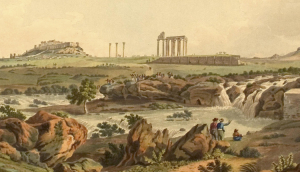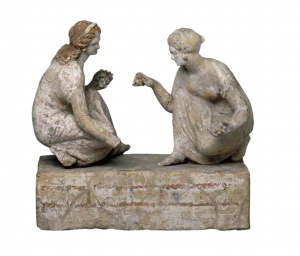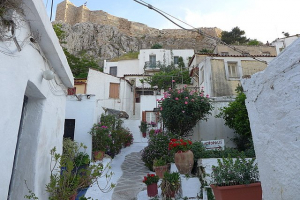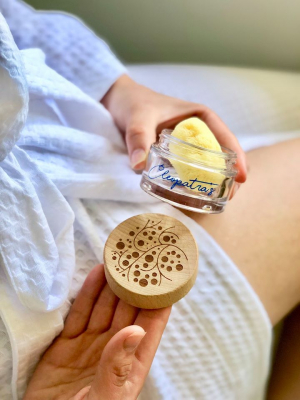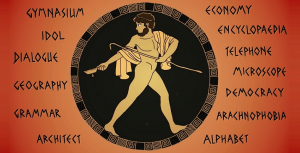BUSINESS CENTRE
XpatAthens
Greek Goddess Dip
Preparation takes 5 mins, and it can serve 4-6 people.
- ½ cup packed fresh dill
- ½ cup packed fresh mint
- ½ cup packed fresh parsley
- ⅓ cup packed fresh basil
- 2 garlic cloves, chopped
- 2 scallions, white and green parts, sliced
- 1 ½ tablespoons freshly squeezed lemon juice
- Pinch salt, more to taste
- ½ cup extra virgin olive oil
- ½ cup crumbled feta cheese
- ½ cup Greek yogurt
- ¼ cup mayonnaise, optional
- Raw chopped vegetables or pita chips, for serving
School Pizza Bar ~ Best Pizza In Athens
The menu is rather amusing, with each page offering valuable "lessons". It was quite loud, on account of the Saturday night bustle (also reminiscent of school cafeterias). The only thing that won't remind you of school is the food. School offers the best pizza in Athens, by far! The pizzas are large (8 generous slices), so plan on sharing, especially if you get appetizers. The pizza crust is thin and the amount of cheese is manageable (often not the case with pizza in Greece). We had the Mushroom Pizza (oyster and white mushrooms, smoked Italian pancetta, cherry tomatoes, garlic oil and parsley) which we all agreed was superb.
Appetizers of interest include a very generous charcuterie platter and, what is best described as an alternative take on spanakopita - spinach and cheese mixture wrapped in kadaifi pastry. The dessert selection is nothing out of the ordinary, but Nonna's Cheesecake is promising. The wine selection is average; there are a couple of Italian whites and reds and the rest are Greek wines, all available by the glass or bottle.
Overall, a very positive experience. Can't wait to go again to try another pizza!
Address: Plateia Agias Irinis 8, Athens 105 60
Telephone: 210 32 51 444
Facebook: https://www.facebook.com/SchoolPizzaBar/
By XpatAthens reader: Eleni Philos
Santorini Among Most Unbelievable Places You Should Visit
To read this article in full, please visit: Medium
Plans to Uncover Athens’ Hidden River Are Underway
Online Activities For Kids At The Museum Of Cycladic Art
Although the museum remains closed, through a series of online activities they invite us on a creative journey through time. The online programs aim to familiarize kids with how children in ancient Greece had fun and challenge them to try and recreate some of the most iconic ancient Greek toys and games.
Since ancient times the pedagogical value and significance of toys has been well established. Children used to play with rattles, dolls, wheeled toys, spinning tops, carved wooden animals and more, and although most of these toys sound pretty boring today, they enjoyed their toys just as much as children do today. Team games were also quite popular as many ancient Greek vases show images of children playing games together. Hide and seek, blind man’s buff, statues, hopscotch, puzzles, and riddles are some of the games played in ancient Greece just as they still are today!
The museum invites kids to have fun online and get them excited about ancient culture by digging deep into Greek history and culture! Discover the Museum of Cycladic Art's online repository here.
Anafiotika: The Hidden Island Of Athens
With patches of cool and quiet, Anafiotika is a hideaway for about 60 residents who want a slow life.
It was built in the 19th-Century by workers from the tiny island of Anafi in the Cyclades, hence the name. In 1841, King Otto I encouraged workers to come and help transform the new capital of independent Greece into a modern metropolis and refurbish his palace.
Carpenters and masons from the Cycladic island of Anafi came, along with other workers from the Cyclades. They took over the rocky terrain located just below the north slope of the Acropolis, hastily erecting houses, taking advantage of an Ottoman law that decreed that if you could put up a structure between sunset and sunrise, the property became yours.
The first two inhabitants were G. Damigos, carpenter, and M. Sigalas, construction workers. Soon, workers from other Cycladic islands also started to arrive there, to work as carpenters or even stone and marble workers, in a further buildings reconstruction period in Athens, but also in the following era after the end of the reign of King Otto.
In 1922, immigrants from Minor East were also established here, altering the population that was up to that time only from Cycladic islands.
In 1950, part of this neighborhood was destroyed for archeologic research and in 1970 the state started to buy the houses.
Anafiotika: Whitewashed buildings in Athens
Today, Anafiotika retains the charm of simple, whitewashed buildings of the island of Anafi with an irresistible lure of Bougainvillea flowers, clay pots, and roaming cats sitting in the sun.
There are only about 45 houses remaining, while the little streets from Stratonos to the Acropolis rock are still unnamed and the houses are referred to as “Anafiotika 1”, “Anafiotika 2” etc.
The neighborhood has small, cubic houses and narrow streets that often end up to ladders or even dead-ends at terraces, places to sit and enjoy the night view of the city.
As one travel site put it: "In this oasis of tranquility, nestled beneath the walls of the Acropolis, the intensity of Athens seems miles away."
Originally published on: greekreporter.com
Cleopatra's Sponges
How 7 Athens Neighborhoods Got Their Names
Legend intertwines with benevolent acts in the naming of Psychiko. According to one account, the area earned its name when the marathoner Pheidippides, after announcing the victory of the Athenians over the Persians in the Battle of Marathon, drew his last breath there. "Psyche," meaning soul in Greek, reflects Pheidippides breathing his soul away. Alternatively, the name is associated with Osia Filothei, who, out of goodwill, opened a well to quench the thirst of passersby and farmers—an act termed "psychiko" in Greek, earning her the honor of having the area named after her.
Patisia's nomenclature traces back to a peculiar origin. The name is derived from the phrase "papa pata isia," roughly translating to "walk straight" in English. Local children coined this term to tease a perpetually intoxicated Turkish Aga who stumbled in the area. The children, witnessing his unsteady steps, would playfully shout "papa pata isia," leading to the christening of the region as Patisia.
The Greek Language: A Collection Οf Oddities & Fascinating Features
1. The Longest Word in Greek (and in the World)
Greek is famous for its love of compound words, where different words are combined to create a single term. In fact, it holds the record for the longest word ever written. This mouthful comes from Aristophanes' comedy Ecclesiazusae and has a staggering 171 letters:
Lopadotemachoselachogaleokranioleipsanodrimypotrimmatosilphioparaomelitokatakechymenokichlepikossyphophatto
peristeralektryonoptekephalliokigklopeleiolagōiosiraiobaphētraganopterýgōn.
This word is a description of a fictional dish that combines a myriad of ingredients, showcasing the Greeks’ love for detailed, descriptive compounds. It’s a bit of a joke in itself, poking fun at overly complex names.
2. Words That Exist Only in Greek
Greek is rich in words that are so tied to its culture and worldview that they don’t have a direct translation in other languages. Here are a couple of examples:
- Meraki (μεράκι): This beautiful word describes doing something with soul, creativity, or love—putting "a piece of yourself" into what you're doing. Whether it's cooking a meal or writing a letter, meraki means going the extra mile to make it special.
- Philoxenia (φιλοξενία): Literally meaning "love of strangers," this term refers to the deeply rooted Greek tradition of hospitality. It’s more than just being polite—philoxenia is about making guests feel like family.
- Eudaimonia (ευδαιμονία): Often translated as "happiness," it’s more accurately defined as a state of being good-spirited or flourishing—essentially, the pursuit of a fulfilling, meaningful life, which was central to ancient Greek philosophy.
3. The Dual Number: When Two is Special
While most languages today use singular and plural forms, ancient Greek also had a dual number. This unique grammatical form was used when referring to exactly two people or things. So, instead of saying “we” (plural) when talking about two people, ancient Greeks would use a specific form for "the two of us."
The dual number was used in verb conjugation, pronouns, and even nouns. For example, the word "ὀφθαλμός" meaning eye was the singular form, "ὀφθαλμοί" the plural, and "τὼ ὀφθαλμὼ" was used to refer to the pair of eyes. The dual number slowly disappeared from the language by the Classical period, but it’s a fascinating reminder of the precision in ancient Greek grammar.
4. Koine Greek: The First Global Language
Koine Greek could be considered the first global language in human history. Emerging after the conquests of Alexander the Great, it spread across a vast territory from Greece to Egypt, Persia, and even India. People from vastly different regions and cultures used it as a lingua franca, facilitating trade, diplomacy, and intellectual exchange.
Koine Greek was also the language of early Christianity, as the New Testament was written in it, and it played a crucial role in the spread of religious ideas. Its wide-reaching influence made Greek one of the earliest languages to bridge disparate cultures, a precursor to languages like English in modern global communication.
5. Compound Words: The Art of Building New Meanings
Greek has a remarkable capacity to create new words through compounding—joining two or more words together to express a complex idea. For example:
- Anthropology (ανθρωπολογία): Comes from anthrōpos (human) and logos (study), meaning "the study of humans."
- Television (τηλεόραση): Combines tele (far) and vision (sight), describing the transmission of visual media over a distance.
What’s unique about Greek compounding is that it allows for incredible precision in describing abstract concepts, emotions, and scientific phenomena. Greek words were so flexible in this regard that they became the foundation for much of the vocabulary used in modern science and medicine today.
6. Greek's Contribution to Modern Medical & Scientific Terminology
If you've ever wondered why medical terms or scientific classifications sound so complicated, it’s because they’re often built on Greek roots. Greek provides a huge percentage of the vocabulary used in the fields of medicine, biology, and astronomy, among others. Terms like:
- Cardiology (καρδιολογία) from kardia (heart) and logos (study of).
- Photosynthesis (φωτοσύνθεση) from phos (light) and synthesis (putting together).
7. Polytonic Orthography: A Dance of Accents
For much of its history, Greek used a polytonic (multi-accented) system of writing. This system included three accent marks (acute, grave, and circumflex) to indicate different pitch patterns in pronunciation. Ancient Greek was a tonal language, and these accents were essential for clarity in meaning.
For example, the word οἶκος (oîkos) means "house," while ὅς (hós) means "who." The use of accents differentiated these meanings in both speech and writing. Though the polytonic system was officially replaced by the simpler monotonic system in 1982, many historical texts still retain this rich dance of accents, making the written language as visually distinct as it is meaningful.
Perception vs. Reality
Sometimes perception (Spring is here) and reality (it’s still cold) are two different things. Sometimes perception (crisis continues) and reality (crisis continues) are very much in line. I’m never sure which one of those has to change first for the other to follow suit. Does reality change our perceptions, or can one’s perception change one’s reality?
My perception over the past several weeks is that Greece, somehow, has turned a corner. At least on a macro level, the economy seems to have eased away from the brink, and all signs are pointing to a slow pattern of recovery. At least this is my perception, and those of many others I’ve spoken with.
However, looking outside and overhearing conversations on the street or in the café, I’m not quite sure…
Here is my problem with perception vs. reality: I don't know which one to believe! So, as with most things, I turn to Google for help. I have a bunch of news feeds set up on my internet homepage – from around the world, but also from Greek news sources. The headlines from this week are oh-so-confusing:
Cost of borrowing via T-bills drops to pre-bailout levels
City Hall's anti-graffiti campaign reaches Monastiraki
IBM to open New center in Athens for big data analytics
Benefits to all single-parent families and new unemployed
But also:
Supermarket chains sense worst is yet to come
GDP falls by €40bn in four years
Golden Dawn MP praises Hitler as a 'great personality'
My own strong perception is that Greece is changing. In small steps, to be sure, but changing nonetheless. This perception is also echoed by my international friends and colleagues who seem to believe that Greece is getting its act together. And many of whom, it seems, have already booked a holiday here this summer.
Perception is reality. Western self-help psychology tells us that changing our perception can change our reality. And I tend to agree. I feel (want, hope) that Greece is changing, slowly crawling to a better place. And maybe if we all started to believe this, our perception would slowly shift, our mood would slowly change, our interactions would improve, and our overall experience of Greece would improve is subtle ways. Thus, by believing we have turned a corner, we will have changed our reality. Naïve? Perhaps… Effective? Most likely…
In the end, I suppose we have to make our own reality, and our individual perception will constantly shift depending on where our day takes us. Maybe the trick is to ‘manage’ our perception like we manage our news feeds.
One thing is for sure: this weekend’s perception (long weekend) and reality (long weekend) are very much in line. Happy Easter to all :)
Until next week,
Jack
In this weekly space, keep up with ‘Jack’ as he navigates daily life in Athens… Anecdotes, stories, hits & misses, the good, the bad and, well, the rest…





